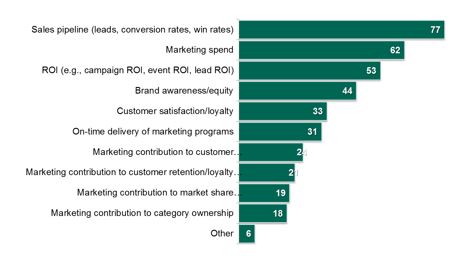Efficiency vs. Effectiveness Metrics
In his book, The Effective Executive, Peter Drucker explained the difference between efficiency and effectiveness: “Efficiency is doing things right. Effectiveness is doing the right things.” He strongly advised focusing first on effectiveness before efficiency. Along with outcome-based and leading-indicators metrics, Marketers also need both efficiency and effectiveness metrics. Here’s an easy way to distinguish whether your metric is one or the other:
- If the metric is measuring how well you squeeze out waste or cost or measure maximum output for input, it’s most likely an efficiency metric. Marketing spend, ROI, and cost/per lead, lead/rep are examples of efficiency metrics.
- If the metric is measuring how well you are contributing to or producing a desired result, it is most likely an effectiveness metric. Share of preference, share of wallet, products/customers are examples of effectiveness metrics.
As we have learned from over a decade of research on marketing metrics, many marketers are doing a good job of establishing, monitoring, and managing efficiency metrics and not as good of a job with developing, measuring, and managing effectiveness metrics.
This propensity to focus on efficiency metrics ultimately creates a problem for marketing. You can be improving efficiency, which has nothing to do with whether or not what you are currently doing is the right thing to do, while not actually becoming less effective. Effectiveness is about achieving the right result, or being on the right path. When we are positively impacting and contributing to the right result, then we earn our right to participate in strategic conversations.
It may be easier to identify, track and manage efficiency metrics but that may not be the only reason we see more efficiency related metrics. Many people assume that they are on the right track so if and when there is a problem, they address it by trying to make the process more efficient without questioning whether they are going in the right direction. But if you are going in the wrong direction, becoming more efficient will actually make the problem worse. For example, let’s say your company wants to grow its revenue by some amount. As a marketer, you believe you can affect this by producing some additional business from existing customers. So, you are monitoring and improving the inquiries, deals, cost per new deal, etc. The company is growing but its market share is declining. Why, because the growth opportunity is really outside the existing customer segment. So while marketing is becoming more and more efficient at generating business from existing customers, the company’s market share is actually declining and the competitors are achieving greater market dominance.
What’s really important is effectiveness. In the end, it doesn’t matter if your business is spending the least amount possible or your demand-generation initiatives are streamlined. What matters is whether marketing is solving the right problems and moving the right business needles.
Before you start thinking about how to improve your efficiency, step back and think about how marketing is expected to move the needle and measure its effectiveness. Don’t misunderstand, efficiency is extremely important and you will need efficiency metrics. Improving efficiency can make a difference, but only if you’re on the right path. And the only way to know that is to have effectiveness metrics in place as well. Efficiency is important, but powerless without effectiveness. Effectiveness opens the door for efficiency.

